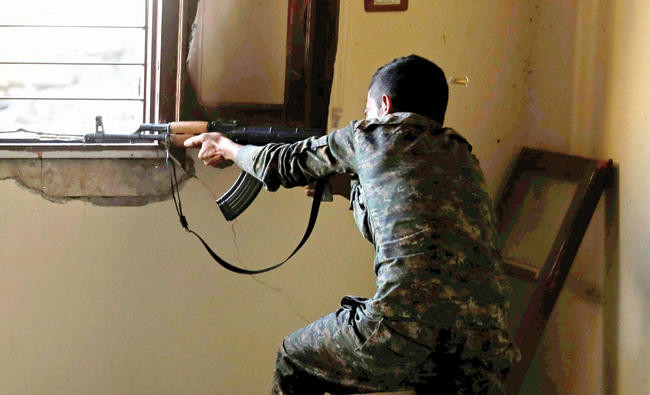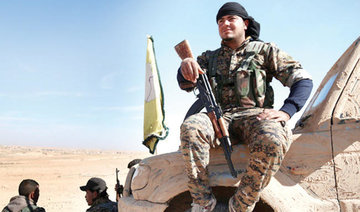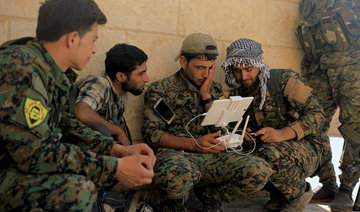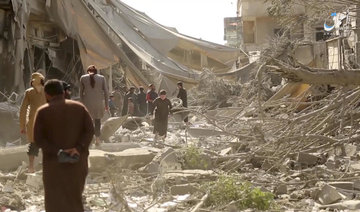HAWI AL-HAWA, Syria: As fighters from Daesh retreat into a shrinking part of Syria’s Raqqa, they are dragging along terrified civilians for cover against a ferocious US-backed onslaught.
Locals who managed to flee describe being herded into apartments in buildings used by terrorists as makeshift military bases, and serving as human shields for fighters as they collect water.
Civilians say the tactic — used elsewhere by the group to slow its opponents — is increasingly putting them in the cross hairs of US air power and allied fighters as they battle Daesh in densely populated districts near Raqqa’s center.
Raqqa resident Umm Alaa and her family were twice forced to provide cover to Daesh terrorists, she told AFP, hours after her escape from the city.
“Weeks ago, an Iraqi Daesh fighter came to our house in Al-Barid and told us it had become a military zone,” she said, sitting on a plastic chair outside a mosque in Hawi Al-Hawa, a western suburb of Raqqa controlled by the US-backed force.
Daesh moved her with her husband, their son Alaa and two-year-old grandson Hassan into a nearby building and refused their pleas to return home.
Three days later, terrorists displaced them again, this time to a damaged building with other families in the battle-ravaged district of Al-Badu.
“They were holding us as human shields. They were keeping us there to protect themselves,” said her husband Abu Alaa, a thick leather belt holding up the oversized trousers hanging off his bony frame.
“Daesh told us, ‘If you leave Raqqa, they are going to destroy the whole city over our heads,’” he said.
The whole family escaped on foot with other civilians on Friday, and like all the civilians who spoke to AFP, they refused to give their full names for fear of retribution against friends and relatives still stuck inside the city.
The US-backed Syrian Democratic Forces (SDF) broke into Raqqa in June, and has since captured around 90 percent of the city, with the help of heavy US-led airstrikes.
Tens of thousands of civilians have fled, but with fighting and airstrikes concentrated on a shrinking Daesh-held section of the city, the exodus has slowed to a trickle.
As its options dwindle, terrorists are taking up positions inside residential buildings, said Mohannad, a fair-skinned woman with pale green eyes who also escaped Al-Badu with her four children.
“They tried to move into the basement or the first floor of our buildings because it protected them from airstrikes,” she told AFP.
Daesh fighters sought out apartments left behind by fleeing families, so Mohannad began putting out clothes and blankets on the balconies of empty ones to trick militants into thinking they were occupied.
She and her children were forced to move four times, and when they were moved into Al-Badu there was little to eat.
They were not allowed to leave except to draw water from nearby boreholes.
And even then, the trips were a way for Daesh fighters to move using civilian cover, said Umm Mohammad, a heavyset woman who also fled from Al-Badu.
“At the wells, Daesh would allow its fighters to fill up water first and made civilians wait for hours to protect them from airstrikes,” she said.
Her eldest son Mohammad, 19, would leave home at 4 a.m. to draw water from a nearby well and often not return for six hours.
“Days ago, he left but never came back. We learned there was an airstrike there. I couldn’t even find his sandals.”
The Syrian Observatory for Human Rights monitor said a US-led strike killed 18 civilians gathered at a water well in Raqqa on Tuesday. AFP could not confirm if Mohammad was among them.
In late September, the coalition acknowledged the deaths of 735 civilians in its strikes on Syria and Iraq since 2014, but the Britain-based Observatory says hundreds have been killed in Raqqa alone since June.
Among them, said Umm Alaa, was her son, a pharmacist who was killed in a raid as he helped wounded civilians.
“To kill a single Daesh fighter, ten civilians are being killed,” Umm Alaa said, her voice cracking as she put black socks on the tiny feet of Alaa’s son, her grandson Hassan.
“They fire at each other and we’re in the middle.”
Coalition spokesman Col. Ryan Dillon said Daesh was likely holding civilians hostage in positions including the national hospital in central Raqqa.
“The coalition takes extraordinary care in our planning and operations to ensure no harm is inflicted upon innocent civilians,” he told AFP.
But those precautions “are not sufficient,” said Nadim Houry, director of Human Rights Watch’s terrorism and counterterrorism program.
“Civilians could be saved. That may mean at times slowing down the operation, advancing more slowly, taking more precautions, maybe not using a massive bomb against a sniper,” he told AFP.
Houry said relying on drone footage to determine whether civilians were present before a strike was not enough precisely because they were trapped inside homes.
“The battle isn’t just about retaking a particular building or retaking square meters. Ultimately it’s about protecting civilians.”
Trapped in Raqqa, civilians become human shields for Daesh
Trapped in Raqqa, civilians become human shields for Daesh

‘Many more’ Conservative MPs back UK govt stance on Israel: MP

- Mark Pritchard: PM ‘on right side of history’ after joint statement condemning Gaza war
- Britain must recognize Palestinian state in ‘huge symbol of support’
LONDON: “Many more” Conservative MPs in the UK privately support calls by Prime Minister Keir Starmer and British allies for Israel to end its Gaza war, a Conservative MP has said.
Mark Pritchard told LBC that Starmer is on the “right side of history” and “humanity,” The Independent reported on Saturday.
However, Pritchard refused to criticize Conservative leader Kemi Badenoch, who questioned new British sanctions on Israeli settlers and a joint UK-France-Canada statement on Gaza this week.
The leaders of the three countries condemned “egregious” Israeli actions in Gaza and threatened to take “concrete actions” if Prime Minister Benjamin Netanyahu fails to change course.
In response, Netanyahu accused the UK, France and Canada of being on the “wrong side of justice.”
Pritchard, who describes himself as strongly pro-Israel, told LBC: “Half the population of Gaza are children. They are being literally bombed to bits every single day. They are being slowly starved.
“It’s absolutely right the UK prime minister, who so happens to be a Labour prime minister right now, would stand up on the right side.
“I push it back to the Israeli prime minister. I think Keir Starmer and those standing up for the children of Gaza are on the right side of history, the right side of humanity and are making the right moral judgment.”
Pritchard said he now believes in the necessity of Britain recognizing a Palestinian state. “It may be symbolic, but I think it will be a huge symbol of support both for the Israelis that want to see that and also for the Palestinians. But the key point at the moment is the Israeli government need to be held to account,” he added.
“I support the UK prime minister and many more, by the way, in the British Conservative Party, are coming up to me privately at the moment.”
On Friday, Badenoch said the government’s new actions targeting Israeli settlers and trade relations with the country are not the “right way” to resolve differences with Netanyahu.
Pritchard told LBC: “I’m coming on to support Kemi on the comments on antisemitism and supporting the prime minister on his strong stand, finally, on what’s going on in Gaza.”
UAE hits record May temperature of 51.6C

- The highest temperature recorded over the country was 51.6C in Sweihan (Al Ain)
- Scientists have shown that recurring heatwaves are a clear marker of global warming
DUBAI: The United Arab Emirates breached its May temperature record for the second day in a row, hitting 51.6 degrees Celsius on Saturday, according to the National Center of Meteorology.
“The highest temperature recorded over the country today is 51.6C in Sweihan (Al Ain) at 13:45 UAE local time (0945 GMT),” the office said in a post on X, 1.2C hotter than the temperature recorded on Friday in the Abu Dhabi area.
Both those temperatures exceeded a previous record for the month of 50.2 Celsius recorded in May 2009, according to the meteorology office.
The desert nation lies in one of the planet’s hottest regions and one which is particularly vulnerable to climate change.
Scientists have shown that recurring heatwaves are a clear marker of global warming and that these heatwaves are set to become more frequent, longer and more intense.
The number of extremely hot days has nearly doubled globally in the past three decades.
According to a 2022 Greenpeace study, the Middle East is at high risk of water and food scarcity as well as severe heat waves as a result of climate change.
The report, which focused on six countries, found the region was warming nearly twice as fast as the global average, making its food and water supplies “extremely vulnerable” to climate change.
Nine of Gazan doctor’s 10 children killed in Israeli air strike

- Dr. Alaa Al-Najjar also saw her husband, Dr. Hamdi Al-Najjar, critically injured
- Couple’s only surviving child, 11-year-old boy, was severely wounded
LONDON: A pediatrician working in southern Gaza has lost nine of her 10 children in an Israeli air strike that hit her family home, in what fellow medics have described as an “unimaginable” tragedy.
Dr. Alaa Al-Najjar, who was on duty at the Nasser Medical Complex in Khan Younis at the time of the strike, also saw her husband, Dr. Hamdi Al-Najjar, critically injured.
The couple’s only surviving child, an 11-year-old boy, was severely wounded and underwent emergency surgery on Friday, according to reports.
“This is the reality our medical staff in Gaza endure. Words fall short in describing the pain,” said Dr. Muneer Alboursh, director general of Gaza’s Hamas-run health ministry. “In Gaza, it is not only healthcare workers who are targeted, Israel’s aggression goes further, wiping out entire families.”
Graphic footage shared by Palestinian Civil Defense, and verified by media outlets including the BBC, showed the remains of small children being pulled from the rubble of a collapsed building near a petrol station in Khan Younis.
British surgeon Dr. Graeme Groom, who is volunteering at Nasser hospital, said Dr Al-Najjar’s surviving son was his final patient of the day.
“He was very badly injured and seemed much younger as we lifted him onto the operating table,” he said in a video posted to social media.
Groom added that the child’s father, also a physician at the same hospital, had “no political and no military connections and doesn’t seem to be prominent on social media,” calling the strike “a particularly sad day.”
He continued: “It is unimaginable for that poor woman, both of them are doctors here… and yet his poor wife is the only uninjured one, who has the prospect of losing her husband.”
Relative Youssef Al-Najjar, speaking to AFP, made an emotional plea: “Enough. Have mercy on us. We plead to all countries, the international community, the people, Hamas, and all factions to have mercy on us. We are exhausted from the displacement and the hunger.”
Dr. Victoria Rose, another British doctor at the hospital, said the family had lived near a petrol station and speculated that the strike may have caused or been worsened by a large explosion. “That is life in Gaza. That is the way it goes in Gaza,” she said.
The Israel Defence Forces did not comment directly on the strike, but in a general statement said it had hit more than 100 targets across Gaza in a 24-hour period.
The Hamas-run health ministry reported at least 74 Palestinian deaths in that time frame alone.
The UN has warned that Gaza may be entering its “cruelest phase” of the war, with Secretary-General Antonio Guterres denouncing Israel’s restrictions on aid as exacerbating a humanitarian catastrophe.
Although Israel partially lifted its blockade this week, allowing limited aid to enter, the UN says the deliveries fall far short of the 500–600 trucks of supplies needed daily to meet basic needs for the territory’s 2.1 million people.
Since Israel launched its offensive after Hamas militants stormed into Israel, killing around 1,200 people and abducting 251 others, on Oct. 7, 2023, more than 53,000 Palestinians have been killed, according to Gaza’s health ministry, which includes women and children in its total but does not differentiate between civilians and combatants.
Erdogan, Syria’s Sharaa hold talks in Istanbul

- Video footage on Turkish television showed Erdogan shaking hands with Sharaa
- The two countries’ foreign ministers also attended the talks
ISTANBUL: Turkish President Tayyip Erdogan was holding talks with Syrian President Ahmed Al-Sharaa in Istanbul on Saturday, news channel CNN Turk and state media said, broadcasting video of the two leaders greeting each other.
The visit comes the day after US President Donald Trump’s administration issued orders that it said would effectively lift sanctions on Syria. Trump had pledged to unwind the measures to help the country rebuild after its devastating civil war.
Video footage on Turkish television showed Erdogan shaking hands with Sharaa as he emerged from his car at the Dolmabahce Palace on the shores of the Bosphorus Strait in Turkiye’s largest city.
The two countries’ foreign ministers also attended the talks, as well as Turkiye’s defense minister and the head of the Turkish MIT intelligence agency, according to Turkiye’s state-owned Anadolu news agency.
The Syrian delegation also included Defense Minister Murhaf Abu Qasra, according to Syrian state news agency SANA.
MIT chief Ibrahim Kalin and Sharaa this week held talks in Syria on the Syrian Kurdish YPG militant group laying down its weapons and integrating into Syrian security forces, a Turkish security source said previously.
US strike on Yemen kills Al-Qaeda members: Yemeni security sources

- “Five Al-Qaeda members were eliminated,” said a security source in Abyan
- Washington once regarded the group as the militant network’s most dangerous branch
DUBAI: Five Al-Qaeda members have been killed in a strike blamed on the United States in southern Yemen, two Yemeni security sources told AFP on Saturday.
“Residents of the area informed us of the US strike... five Al-Qaeda members were eliminated,” said a security source in Abyan province, which borders the seat of Yemen’s internationally-recognized government in Aden.
“The US strike on Friday evening north of Khabar Al-Maraqsha killed five,” said a second source, referring to a mountainous area known to be used by Al-Qaeda.
The second security source added that, though the names of those killed in the strike were not known, it was believed one of Al-Qaeda’s local leaders was among the dead.
Washington once regarded the group, known as Al-Qaeda in the Arabian Peninsula (AQAP), as the militant network’s most dangerous branch.
Born in 2009 from the merger of Al-Qaeda’s Yemeni and Saudi factions, AQAP grew and developed in the chaos of Yemen’s war, which since 2015 has pitted the Iran-backed Houthi militants against a Saudi-led coalition backing the government.
Earlier this month, the United States agreed a ceasefire with the Houthis, who have controlled large swathes of Yemen for more than a decade, ending weeks of intense American strikes on militant-held areas of the country.
The Houthis began firing at shipping in the Red Sea and Gulf of Aden in November 2023, weeks after the start of the Israel-Hamas war, prompting military strikes by the US and Britain beginning in January 2024.
The conflict in Yemen has caused hundreds of thousands of deaths and triggered one of the world’s worst humanitarian crises, although fighting decreased significantly after a UN-negotiated six-month truce in 2022.




















